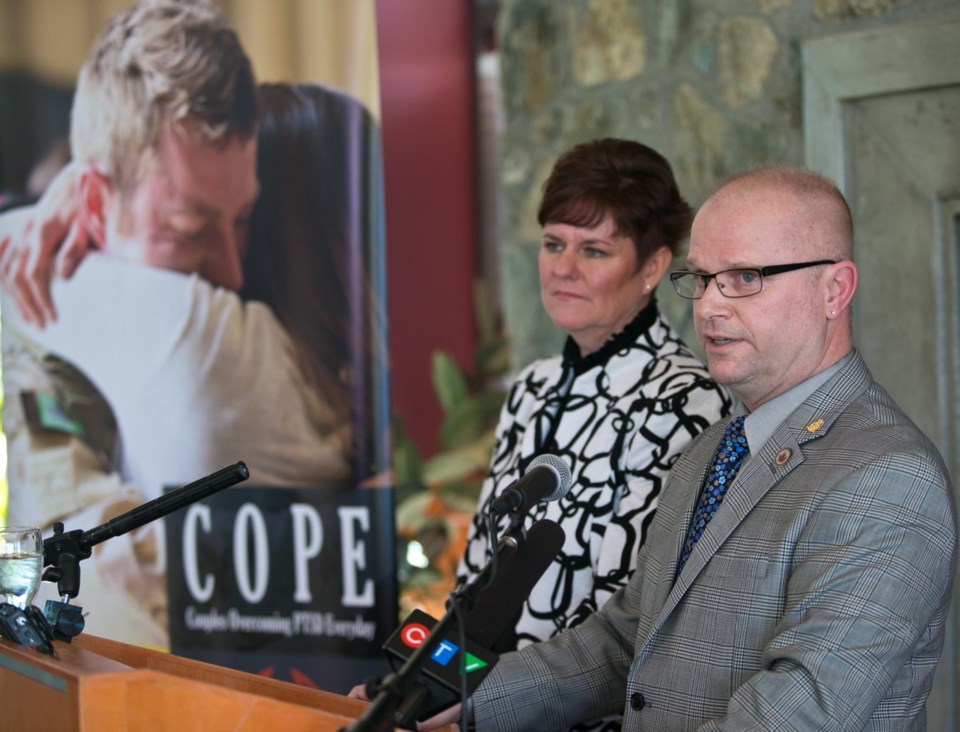Canada’s new Veterans Affairs Minister Erin O’Toole helped launch what he called a “trail-blazing” couples program for sufferers of post-traumatic stress disorder in Victoria on Wednesday.
“Canada has only really been dealing with operational stress issues since the early 2000s,” said O’Toole at the Canadian Forces Base Esquimalt event. “We’ve learned a lot about healing the soldier in the last 10 years and we’re only now spending the attention needed on the family.”
The program, Couples Overcoming PTSD Everyday (COPE), was founded by Sooke couple Chris Linford, a retired lieutenant-colonel, and his wife, Kathryn.
It received $160,000 in funding from the non-profit organization Wounded Warriors Canada to hold a five-day intensive workshop for five couples affected by PTSD. The program includes monthly coaching for one year.
“I don’t know of any program comparable to this for couples in Canada,” said Scott Maxwell, executive director of Wounded Warriors. “Our goal is to not only continue to fund it but to see it become a national program.”
The Linfords will be program mentors. They spoke at the event about how getting help for the effects of PTSD, both individually and as a couple, saved their family relationships and Chris’s life.
“I was going to kill myself. I was going mad,” said Chris, 54, who waited 10 years after being deployed to Rwanda in 1994 to get help. He said he worried he would be labelled weak and thought he could handle the anger, depression and insomnia — until he couldn’t. “When I asked for help, much to my surprise, I got it.”
Chris served in Desert Storm in the Persian Gulf in 1991, but said his experiences in Rwanda caused his PTSD and left him “profoundly altered.”
He was in Rwanda for a 100-day humanitarian mission months after the start of the genocide that saw the slaughter of ethnic minority Tutsis. This overlapped time that the United Nations force was commanded by fellow Canadian Romeo Dallaire, whom Chris cites as an inspiration for his book Warrior Rising: A soldier’s journey to PTSD and back.
“It was calm during the day but at night it was chaos: gunshots, rape, no police force,” he said, describing his feelings of helplessness and frustration. “I felt my Canadian bubble burst. … I’d never met evil before.”
After seeking treatment in 2004, he was able to return to work and served in Afghanistan. But it was treatment in 2011 that led to significant change.
“I received the gold standard of care. … It does work, if you’re willing to do the work,” he said.
His wife also sought therapy to cope with the affects of PTSD on her and their three (now grown) children. She said they “walked on eggshells” around Chris for years.
“We had always been a close couple … but this sucked the life out of our relationship.”
The pair sought help together, creating “a new dynamic of patience and understanding,” she said. “We came to realize the power of sharing with others should not be underestimated.”
They realized other couples and families struggling with PTSD might benefit from the same kind of help. The idea for COPE was born and it’s now their full-time passion project.
“This program won’t cure PTSD,” Chris said. “But it will be another tool in the toolbox.”
Statistics Canada’s 2013 Canadian Forces Mental Health Survey estimated that about five per cent of respondents experienced symptoms associated with PTSD, while 17 per cent reported symptoms of alcohol and mental health disorders such as depression.



